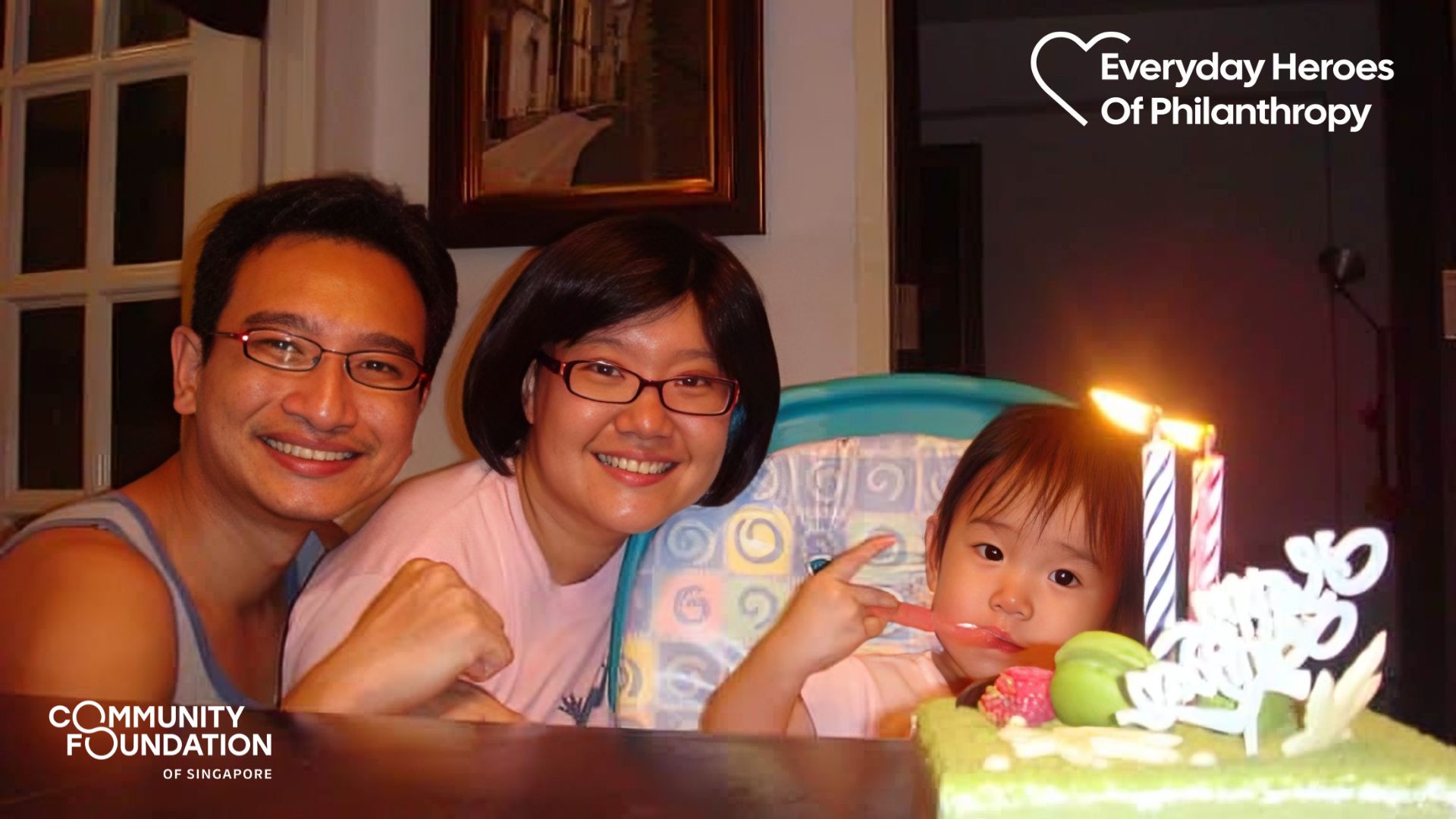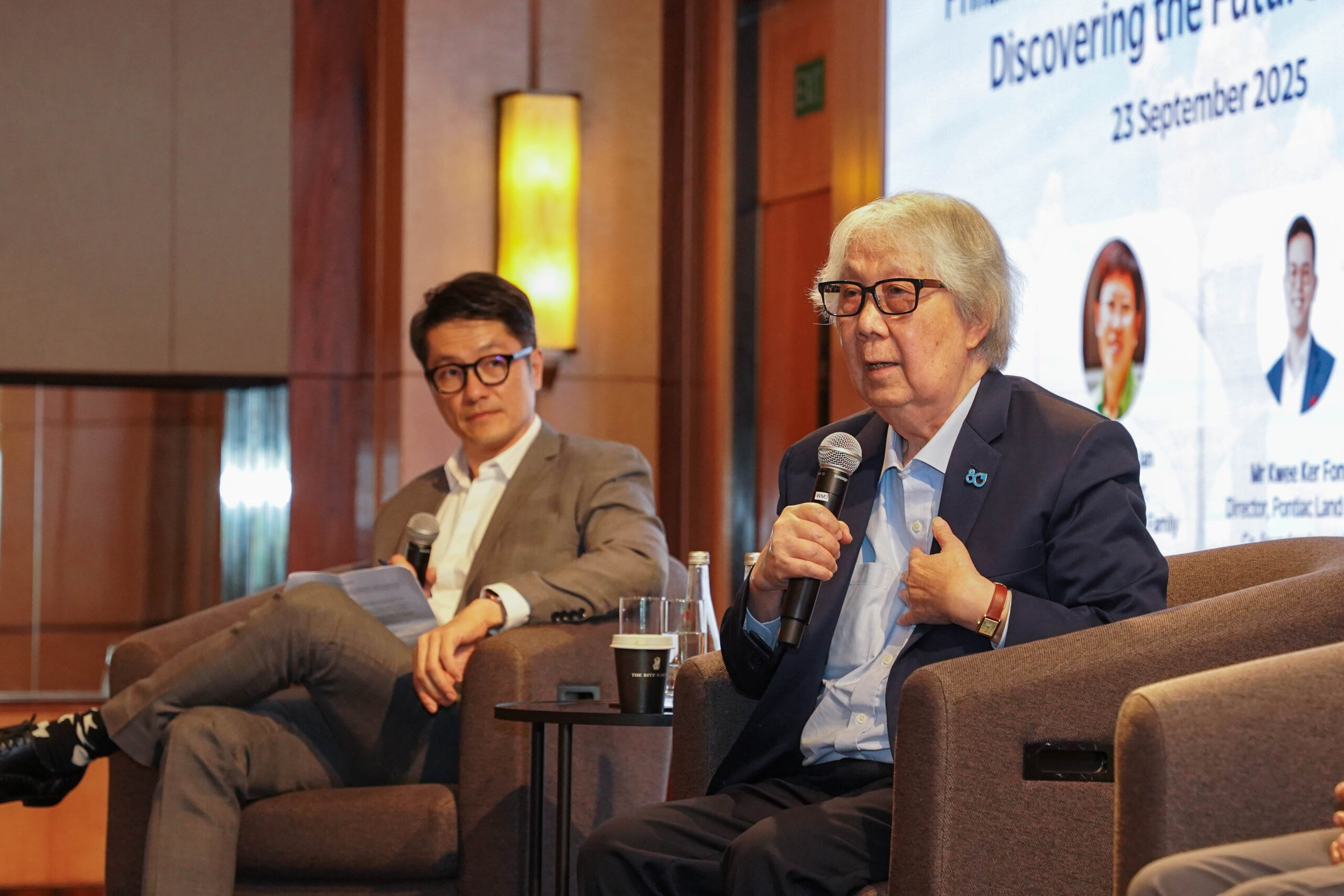#MyGivingJourney X Ravina Kirpalani: Taking family philanthropy to new heights


CFS launched the #MyGivingJourney series, which features extraordinary women in Singapore and their efforts in philanthropy. Our second story features Ravina Kirpalani, Head of Philanthropy at the Enpee Group Foundation, board member of Beyond Social Services and volunteer at HCA Hospice Care.
Mention hospice and most people picture the atmosphere to be heavy or depressing. Instead, it is the exact opposite, says Ravina Kirpalani. Ravina has been volunteering at HCA Hospice Care for over 11 years and rates it as one of the most rewarding experiences in her giving journey.
“I have learnt so much from the patients through their positive attitudes, amazing sense of acceptance and loving interactions. They have a zest for life and want to enjoy whatever time they have left,” she says. “The staff are also wonderful and caring and I leave each volunteer session so much fuller and more joyful than I did when I walked in.”
Spending time with the terminally ill is just one of the many causes Ravina has embraced. As head of philanthropy at the Enpee Group Foundation, she oversees its community work, which stretches from Africa to India and Southeast Asia. The Enpee Group was founded in 1961 by Ravina’s father-in-law in Nigeria and has grown into a $300 million conglomerate.
The Foundation kicked off in 2001 with community initiatives in Nigeria and India, where the group’s manufacturing plants are located. It also collaborates with charities such as the Tulsi Chanrai Foundation which does extensive work in healthcare, through its Mission for Vision, Mission for Primary Health and Mission for Water programmes in Nigeria.
In Singapore, the Foundation supports several educational initiatives. It funds scholarships and bursaries at the National University of Singapore in the areas of solar energy research, environmental studies and medicine. It has also begun sponsoring 10 students who are studying for their nursing certificates at the Institute of Technical Education. And in 2021, it set up a scholarship for three students to complete their BSc in Nursing practice. The Foundation also grants aid to outstanding individuals from India and Nigeria to study for a Masters in Public Administration at the Lee Kuan Yew School of Public Policy (LKYSPP).
To further deepen their philanthropic giving in Singapore, Ravina and her husband Sanjay set up a Donor-Advised Fund with CFS in 2020. This supports smaller charities including the Reading Odyssey programme by Shine Children and Youth Services, which focuses on children from disadvantaged backgrounds with learning difficulties, the Kids Excel enrichment programme run by Catch them Young at partner schools which targets disengaged primary students from needy families, and the Family Justice Support Scheme by Law Society Pro bono Services.
“Education and healthcare are our primary focus because of the ripple effect,” says Ravina. Thanks to the Foundation’s assistance, a student who lost his father to brain cancer when he was just five years old was able to go to medical school and become a doctor. The Foundation is also working with one of the six LKYSPP alumni that it has helped to date on an adolescent health initiative in Nigeria. Aside from this, Ravina finds time to contribute to Beyond Social Services, a charity that helps youths from less privileged backgrounds break away from the poverty cycle.
For Ravina, giving back is an integral part of her family legacy. Growing up in Hong Kong, she saw how her mum volunteered at various charities such as the Duchess of Kent Children’s Hospital. Her mum was also an active member of the Hong Kong Indian Women’s Club, where she did welfare work for the elderly and orphans. Ravina, who now lives in Singapore, is building on that tradition and taking the family’s philanthropy to new heights.
Begin your own journey of giving with CFS. Read more about #MyGivingJourney series here.
This article was written by Sunita Sue Leng, a former financial analyst and journalist, who believes that the written word can be a force for good. She hopes to someday write something worth plagiarising.
CFS launched the #MyGivingJourney series, which features extraordinary women in Singapore and their efforts in philanthropy. Our second story features Ravina Kirpalani, Head of Philanthropy at the Enpee Group Foundation, board member of Beyond Social Services and volunteer at HCA Hospice Care.
Mention hospice and most people picture the atmosphere to be heavy or depressing. Instead, it is the exact opposite, says Ravina Kirpalani. Ravina has been volunteering at HCA Hospice Care for over 11 years and rates it as one of the most rewarding experiences in her giving journey.
“I have learnt so much from the patients through their positive attitudes, amazing sense of acceptance and loving interactions. They have a zest for life and want to enjoy whatever time they have left,” she says. “The staff are also wonderful and caring and I leave each volunteer session so much fuller and more joyful than I did when I walked in.”
Spending time with the terminally ill is just one of the many causes Ravina has embraced. As head of philanthropy at the Enpee Group Foundation, she oversees its community work, which stretches from Africa to India and Southeast Asia. The Enpee Group was founded in 1961 by Ravina’s father-in-law in Nigeria and has grown into a $300 million conglomerate.
The Foundation kicked off in 2001 with community initiatives in Nigeria and India, where the group’s manufacturing plants are located. It also collaborates with charities such as the Tulsi Chanrai Foundation which does extensive work in healthcare, through its Mission for Vision, Mission for Primary Health and Mission for Water programmes in Nigeria.
In Singapore, the Foundation supports several educational initiatives. It funds scholarships and bursaries at the National University of Singapore in the areas of solar energy research, environmental studies and medicine. It has also begun sponsoring 10 students who are studying for their nursing certificates at the Institute of Technical Education. And in 2021, it set up a scholarship for three students to complete their BSc in Nursing practice. The Foundation also grants aid to outstanding individuals from India and Nigeria to study for a Masters in Public Administration at the Lee Kuan Yew School of Public Policy (LKYSPP).
To further deepen their philanthropic giving in Singapore, Ravina and her husband Sanjay set up a Donor-Advised Fund with CFS in 2020. This supports smaller charities including the Reading Odyssey programme by Shine Children and Youth Services, which focuses on children from disadvantaged backgrounds with learning difficulties, the Kids Excel enrichment programme run by Catch them Young at partner schools which targets disengaged primary students from needy families, and the Family Justice Support Scheme by Law Society Pro bono Services.
“Education and healthcare are our primary focus because of the ripple effect,” says Ravina. Thanks to the Foundation’s assistance, a student who lost his father to brain cancer when he was just five years old was able to go to medical school and become a doctor. The Foundation is also working with one of the six LKYSPP alumni that it has helped to date on an adolescent health initiative in Nigeria. Aside from this, Ravina finds time to contribute to Beyond Social Services, a charity that helps youths from less privileged backgrounds break away from the poverty cycle.
For Ravina, giving back is an integral part of her family legacy. Growing up in Hong Kong, she saw how her mum volunteered at various charities such as the Duchess of Kent Children’s Hospital. Her mum was also an active member of the Hong Kong Indian Women’s Club, where she did welfare work for the elderly and orphans. Ravina, who now lives in Singapore, is building on that tradition and taking the family’s philanthropy to new heights.
Begin your own journey of giving with CFS. Read more about #MyGivingJourney series here.
This article was written by Sunita Sue Leng, a former financial analyst and journalist, who believes that the written word can be a force for good. She hopes to someday write something worth plagiarising.
- Related Topics For You: #MYGIVINGJOURNEY, ACCESSING QUALITY EDUCATION, CAREGIVER SUPPORT, CHARITY STORIES, CHILDREN, DONOR STORIES, DONOR-ADVISED FUND, EDUCATION, FAMILIES, HEALTH, INCLUSIVITY & INTEGRATION, LEAVING WITH DIGNITY, MENTAL WELLBEING, PERSONS WITH DISABILITIES, PROMOTING HEALTHCARE, SENIORS, STORIES OF IMPACT, YOUTH


